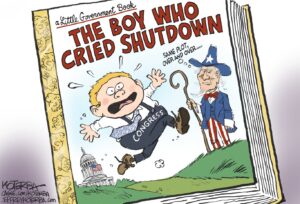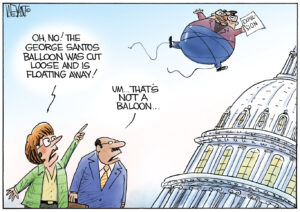Socialism for Dummies
So this is how the "ownership society" works. We own all the bad stuff.So this is how the “ownership society” works. We own all the bad stuff.
It’s been so long since President Bush talked about an “ownership society” that perhaps you’ve forgotten what he meant. Initially, it meant partially privatizing Social Security so that average Americans would fund their own retirement through personal savings and supposedly astute management of their investments. The public recoiled. Notwithstanding Republican presidential candidate John McCain’s continued support for some form of private Social Security accounts, this has about as much chance of clearing Congress as the hapless Washington Nationals have of making the baseball playoffs. That is, no chance.
Now Bush’s “ownership society” has morphed into this: Taxpayers are going to own about $700 billion — or a trillion, or more — in bad debts amassed by what were supposed to be the best financial brains in the world. What we will own are potentially worthless assets for which there are currently no private buyers. After more than three decades of being told we can’t afford to keep a modest safety net beneath the people on Main Street, we have thrown the mother of all lifelines to Wall Street.
This is the conservative dogma that has constrained our politics for a generation.
We’ve been lectured incessantly about costly “entitlements” such as Social Security, Medicare and Medicaid that are supposedly wrecking the federal balance sheet and endangering our collective financial future. How many times have you heard that these programs are “unsustainable” and represent fiscal “time bombs”? I stopped counting about 15 years ago.
Among the other things we’ve been told there is no money for are repairs of decrepit roads and bridges, a boost in mass transit funding to replace at least some of our oil-gulping, automobile-dominated transportation system, increased college aid, more federal money to try to equalize our unequal public education system and expanded health insurance so that more poor kids can see a doctor. This list is, of course, grossly incomplete.
Within weeks, Treasury Department staff members or the apparatchiks attached to some new oversight team are going to be engaged in high-stakes negotiations with businesses over what price the government will pay for their iffy paper. Meanwhile, the same government is prohibited from negotiating with drug companies to get discounts on prescriptions for Medicare patients. Why? Because that would be socialism!
Which raises the larger question. If we can socialize the banking industry, why can’t we socialize the health insurance industry?
The government is going to shoulder business risks that went bad. But for decades the political system has resisted the common-sense suggestion that the risk of getting sick, which we all face, is best handled when it is spread among the broadest possible pool — that is, taxpayers. Here is where our political judgment has taken us: We allow families to be bankrupted by illness, but we won’t allow financial giants to be bankrupted by greed and incompetence.
We don’t have much choice other than to go forward with some version of a financial-system bailout. Without it, we are told, the global economy would be facing a catastrophe on the magnitude of the Great Depression. I do not pretend to have the insight or expertise to counter this argument, and so, like just about everyone else, I reluctantly will have to go along.
But there are some arguments that simply should no longer be accepted.
One is that working Americans must have their future health and retirement benefits substantially cut while Wall Street gets a newfangled “entitlement” of its own. Another is that we just can’t have all the government we need. The disastrous response to Hurricane Katrina was supposed to put an end to the notion that government is always the problem and never the solution. Since government is now the savior of financial operators, no one should dare suggest it shouldn’t operate for the greater social good.
The era of big government is back. Any politician who votes to bail out Wall Street titans while simultaneously telling average Americans to suck it up and tighten their belts should be booted from office. Any politician who claims taxes can continue to be cut in the face of the gargantuan debt we are about to take on should be shown the door.
The chatter in the business world is that a “new model” of finance must emerge from the ruins left by the shattering of the old. The same must apply to our politics, too.
Marie Cocco’s e-mail address is mariecocco(at)washpost.com.
© 2008, Washington Post Writers Group
Your support matters…Independent journalism is under threat and overshadowed by heavily funded mainstream media.
You can help level the playing field. Become a member.
Your tax-deductible contribution keeps us digging beneath the headlines to give you thought-provoking, investigative reporting and analysis that unearths what's really happening- without compromise.
Give today to support our courageous, independent journalists.






You need to be a supporter to comment.
There are currently no responses to this article.
Be the first to respond.